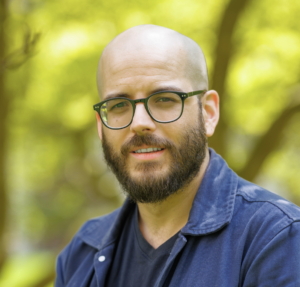
Through the Doctorate in Educational, Child and Adolescent Psychology program at Queen’s University Belfast, Dr Carol Strahan and Dr Hassan Regan incorporated Appreciative Inquiry in nurturing the development of early-career Educational Psychologists. Their column examines their use of nature-inspired metaphors along with Appreciative Inquiry’s role in fostering growth by focusing on individuals’ positive cores and creating a collaborative ecosystem. The approach emphasises building on strengths, inclusivity and shared ownership of change, fostering a constructive mindset and enhanced communication among participants. It’s my pleasure to introduce Carol and Hassan as our voices from the field in this issue of AI Practitioner.
Download Voices from the Field

Keith Storace is a registered psychologist with the Psychology Board of Australia (PsyBA) and an associate fellow with the Australasian College of Health Service Management (ACHSM). He manages a private practice at Kiku Imagination where he applies the Appreciative Dialogue (ApDi) therapy program to assist individuals move toward, strengthen and enjoy what is meaningful while dealing with the challenges they encounter along the way. Keith Storace has been the editor of the Voices from the Field column for AI Practitioner since 2016.
Carol Strahan | Northern Ireland
Dr Carol Strahan is both an occupational and educational psychologist. She is the director of Cavehill Psychology where she seeks to enhance staff and student wellbeing as well as growing potential through her training and supervision. Carol is based in Belfast, Northern Ireland.
Hassan Regan | Northern Ireland
Dr Hassan Regan is an educational psychologist with the Education Authority in Northern Ireland. He also serves as a professional and academic tutor for the Doctorate in Educational, Child, and Adolescent Psychology programme, where he trains early-career Educational Psychologists. Hassan’s professional interests include equity, diversity and inclusion, the impacts of trauma, and supporting individuals seeking sanctuary.
Cultivating a Habitat for Early-Career Educational Psychologists to Thrive
Our collaboration using Appreciative Inquiry (AI) began with a unique opportunity to work with early-career Educational Psychologists (EP) through the Doctorate in Educational, Child, and Adolescent Psychology (DECAP) programme at Queen’s University Belfast. These psychologists, with a wealth of experience, skills and qualities were at a pivotal stage in their careers, and the DECAP programme was designed to nurture and develop their potential to make a meaningful impact on the people, systems and structures they encounter.
Although our paths to AI were different, they were complementary. Carol was drawn to AI with a focus on integrating its principles into organisational change and wellbeing training within her private practice. Hassan, on the other hand, was inspired to apply AI in supervisory relationships and in navigating challenging conversations about differences. Despite these different starting points, our shared goal has remained consistent: to harness the positive core of individuals and foster meaningful, lasting change.
This article delves into our experiences with AI, highlighting its transformative potential in educational psychology and beyond.
Stepping into the forest – The use of metaphor
We chose trees, forests and associated concepts for three key reasons: our shared love of nature, their vital role in our ecosystem, and their rich potential as narrative tools to explore and share our experiences.
We had the opportunity to work with the skills and expertise of early-career EPs to positively impact on the people and ecosystem around them throughout their lives. We consider our use of AI as a way of preparing and helping people grow rather than having the growing done to them or on their behalf of them – we consider this to be a collaborative and generative approach akin to cultivating.
Habitat reflects the idea of a natural home or state, as we believe that people’s natural states are inherently well intentioned and positive – the positive core.
Reforestation is the process of replanting an area with trees, an area that has once been forested; the term reflects how we are drawing on and using a resource that was already there, at least in essence. However, it is not just about replanting; we have to consider the diversity of the environment, the impact we have on those around us and then pick the right place to reforest.
As part of our training in AI, we worked together and supported each other in putting the principles and approaches into action through interrelated projects. There are parallels here with the natural phenomenon of inosculation where trees can grow independently yet together and become intertwined – in our case as practitioners, our separate paths to AI, and our use of AI together.
Making connections in the forest – Introducing AI throughout the DECAP programme
We wanted AI to take root in our practices as psychologists. With a supportive team around us, we had the opportunity to introduce early-career EPs to the approaches and principles underpinning AI through teaching and learning sessions. We also did this in other subtle ways: making use of the SOAR approach, for example, incorporating appreciative conversations during supervision sessions, and using AI to inform questions for feedback, interviews, surveys, research projects and so on.
An assisted, natural approach to reforestation – Using the AI 5D cycle
Focusing on one of the ways that we worked together to cultivate and assist reforestation, we used the AI 5D approach as an interactive way to learn about AI and contribute to the growth and development of early-career EPs on the programme. The framework provided a constructive and inclusive process for exploring student wellbeing.
During sessions, we shared our own experiences of AI and our journey as practitioners, discussed tools such as appreciative journalling, appreciative conversations, how we have used AI in our day-to-day interactions, and our use of SOAR. We made use of a range of AI-related materials and activities to promote thinking, talking and sharing with each other – we, as facilitators, modelled AI in our approach, our thinking and actions. Each cohort had a slightly different though related and ultimately connected area of inquiry:
Year 1 – Being the early-career EP we want to be
The beginning of the course focussed on what theparticipants brought to the course, what they hoped to learn and achieve and, most importantly, how they wanted to be as early-career EPs. This was one of the first things they took part in on the training course to encourage group coherence and integration, as well as being thoughtful and intentional about what they hope to achieve in their training.
Year 2 – Wellbeing: Developing a healthy culture in the DECAP programme
The midpoint of the course in which their area of wellbeing was identified by the trainees themselves. We opted to explore how to develop a healthy culture while in DECAP – looking at what they were already doing, what was working well and what else could be done. The reflective component of this is particularly important as our professional competencies and fitness-to-practise considerations include that we actively engage in ways to support and develop our own strategies for wellbeing. Recognising and addressing challenges can positively impact not only the individual student but also the broader educational community – their habitat.
Year 3 – Being the EP we want to be
The final year of the course in which the area of inquiry was reflecting on experiences and skills they have developed thus far, and considering what they wanted to bring from the past to their future role. We considered what steps people would be taking to become the EPs that they wanted to be. This was one of the last activities that they took part in on the programme, giving them a positive end point to their time on it before the next stage of their journey as qualified practitioner psychologists.
Did we cultivate a habitat for early-career EPs to thrive in?
We agreed that it is challenging to be sure that an individual will thrive in the long term; we remained mindful, hopeful and positive and were attentive to markers of engagement and change. We noticed how engaged people were during the activities. It was positive to hear them laughing and collaborating with each other during and after the activities. Hearing them discuss the AI principles, or talking in appreciative ways, was a positive experience for all of us – a marker that AI ideals were taking root, while helping to cultivate our own feelings of satisfaction and achievement, and to an extent self-efficacy.
Some early-career EPs remained sceptical about the AI approach; however, most were interested in pursuing training to equip them to practice AI themselves as they liked how it fitted with their world views and habitat. They could see how they could contribute to cultivating change in other situations.
Reforestation takes root
Applying AI’s 5D cycle to student wellbeing promoted a positive and inclusive approach, focusing on strengths and aspirations rather than problems and deficits, contributing to a supportive educational environment, something that could be brought forward into their careers. We considered these to be signs that the cultivation and reforestation had started to take root.
We encouraged them to develop personal action plans, important as part of being reflective and reflexive practitioners. We hoped they would become self-sustaining. We also emphasised the importance of considering their plans and revisiting them, reflecting on their responsibility for their own habitat as well as contributing to reforestation in their ecosystem. We hope that they will be sufficiently empowered to do so.
Minimising the climate chaos in our own habitat – Some further reflections
We have ourselves learnt much on the journey of incorporating AI into our work, in navigating and minimising some of the climate chaos inherent in our own habitats and ecosystems. Some key learning points include:
The importance of framing questions positively to elicit constructive responses; the power of storytelling in conveying values and experiences; and the need for ongoing communication to sustain positive change.
By focusing on what was already working well, early-career EPs learnt to appreciate and build upon existing strengths rather than dwelling on problems. It created a more constructive mindset among students.
It encouraged open communication, active listening and shared problem-solving. It fostered a sense of inclusivity and a shared ownership of the change process rather, than the responsibility being with the tutors.
Being part of early-career EPs development emphasised the AI values of diverse perspectives and experiences and reminded us how the strengths of an organisation lie in its people and thei diversity. We also learnt to acknowledge and accept that AI may not suit everyone.
Actively facilitating the AI process has honed our facilitation skills. We have developed a deeper understanding of group dynamics, communication strategies and effective ways to guide participants through each stage of the inquiry, ensuring meaningful engagement and collaboration.
The project has been a transformative learning experience, enriching our AI practice through hands-on application, adaptability, ongoing reflection and an expanded toolkit. We had the opportunity, the means and the motive to do our best to cultivate a habitat for early-career EPs to thrive, and we sincerely hope that we have gone some way to achieving this.



